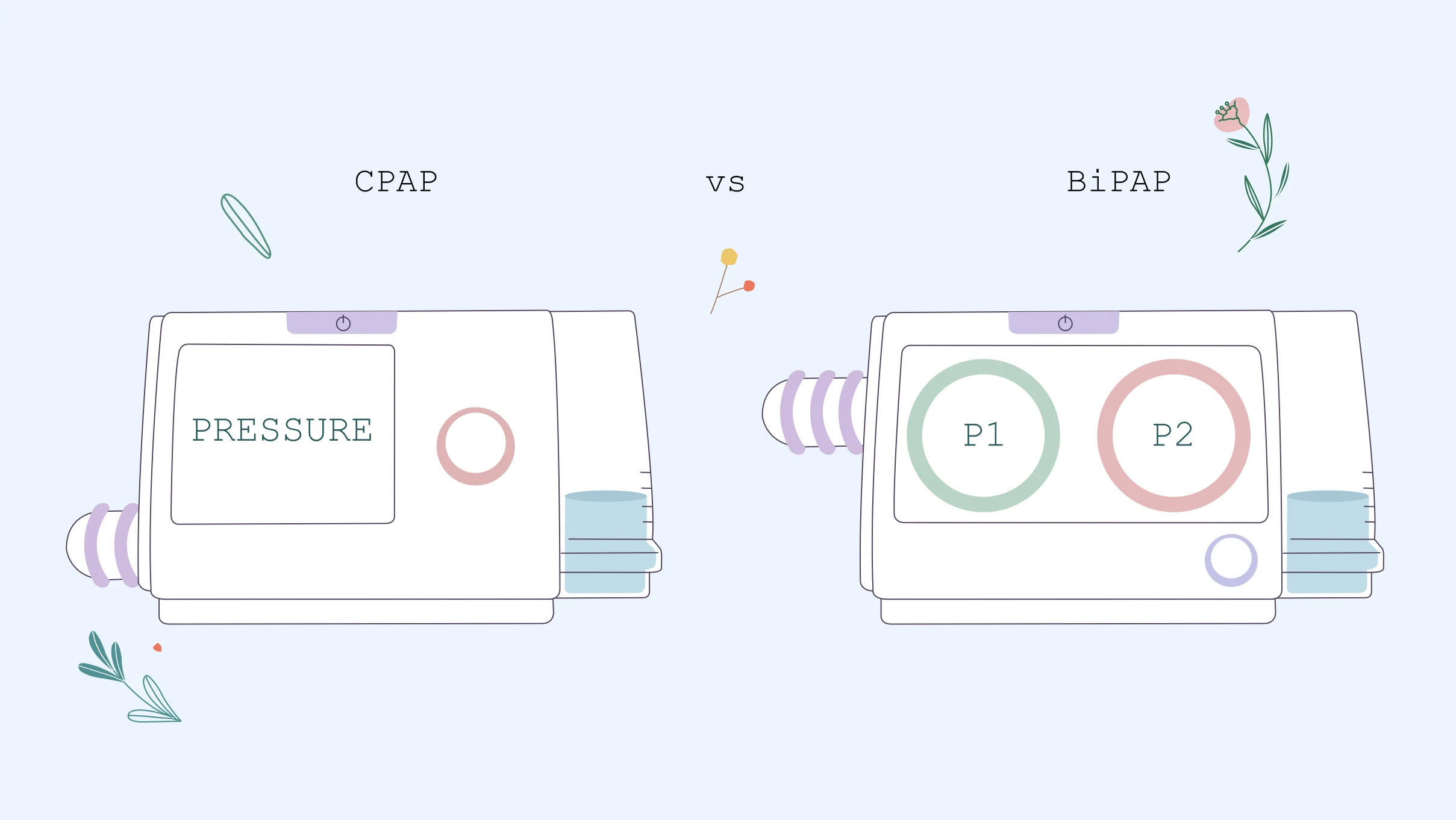CPAP Vs BiPAP: The Difference
Written by

Medical reviewed by


PAP therapy is Positive Airway Pressure, a therapy that uses air pressure to keep the airway open during sleep and is commonly used to treat sleep apnea. It consists of two commonly used modalities of positive airway pressure therapy- Continuous positive airway pressure (CPAP) and Bilevel therapy (BiPAP) commonly used to treat sleep apnea, where your breathing starts and stops frequently.
CPAP is usually recommended for people suffering from obstructive sleep apnea, whereas BiPAP is recommended for severe cases. In today’s article, Sleep Guides India will tell you all the differences between CPAP vs BiPAP, the two primary sleep apnea machines. Read ahead!
What is CPAP?
When you suffer from obstructive sleep apnea, your airways become blocked. CPAP is a machine that helps keep your airways open with the help of mild pressure, delivered via a mask you wear as you sleep.
How Do CPAP Machines Work?
As aforementioned, the CPAP has a tube to regulate air pressure. The machine’s compressor is responsible for a continuous stream of air delivered via the tube into the mask. The machine takes the air present in the room, filters it, and then pressurises it. Then, this air is transferred from the tube to you.
Here, you receive a continuous airflow where your tongue, uvula, and soft palate refrain from moving too far inside the airways. So, when nothing blocks your airways, your breathing doesn’t pause through the night. Hence, it also prevents you from waking up, choking, or gasping for air in the middle of the night.
Benefits of CPAP
- It helps treat sleep apnea.
- Untreated sleep apnea can lead to diabetes, stroke, and even heart disease. Thus, CPAP can improve life quality.
- It reduces daytime sleepiness.
- You can experience better and uninterrupted sleep and reduced snoring.
Drawbacks of CPAP
- It may take some time to get accustomed to the machine.
- It can lead to nasal congestion and dry mouth.
- Some people also find it uncomfortable and cumbersome, especially if they sleep with a partner.
- It can make you feel claustrophobic and also lead to nosebleeds.
What Is BiPAP?
When you have severe sleep apnea, BiPAP can help you out. It is a ventilator device that helps you breathe properly as you sleep. Again, like CPAP, you wear a mask to regulate your breathing.
How Does BiPAP Work?
When you breathe in, a muscle known as the diaphragm helps you with it by moving downwards. This causes a drop in the pressure in the tubes, and the sacs of your lungs can draw the air. Here, BiPAP pushes the pressurised air into your lungs since you cannot do it on your own. This machine is as tiny as a lunchbox and has a facial mask, nasal mask, or nasal plugs attached to them.
Benefits of BiPAP
- It can alternate the airflow pressure. So, while inhaling, the pressure rises and while exhaling it drops.
- It can be comfortable for the users, especially when the pressure requirements are high.
- It is beneficial for patients suffering from neuromuscular disease, which CPAP cannot help with.
Drawbacks of BiPAP
- You may experience dry mouth or nosebleeds.
- It is only used if CPAP can’t rectify the problem.
- It can be expensive.
Difference Between CPAP and BiPAP
Let’s take a look at the difference between CPAP and BiPAP.
| CPAP | BiPAP | |
|---|---|---|
| Pressure Levels | 1 | 2 |
| Pressure Range | 4 to 20 cm H2O | 4 to 30 cm H2O |
| Insurance Coverage | It depends on the type of insurance and the provider. | It depends on the type of insurance and the provider. |
| Best for | Obstructive sleep apnea | CPAP refractory or intolerant OSA, obesity hypoventilation syndromes, neuromuscular disorders, cardiac and pulmonary disorders |
| Cost | Rs 25,000 – Rs 60,000 | Rs 28,000 – Rs 100,000 |
| Setting | 1 | 2 |
Pressure Settings: The main difference between BiPAP machine vs CPAP is that CPAP machine only has one setting option whereas BiPAP can offer two pressure settings. Also, while CPAP is suitable for only obstructive sleep apnea, BiPAP can be for central sleep apnea, neuromuscular disorders, and heart and lung problems.
Cost: Another major difference between CPAP and BiPAP is that BiPAP is more expensive when compared to CPAP.
Ease of Use: Both BiPAP and CPAP machines are portable and can be easily carried wherever you go. However, most doctors don’t recommend BiPAP for obstructive sleep apnea unless CPAP is not working for the patient.
Today, you will also come across CPAP versus BiPAP machines with several add-on features, such as data collection, humidifiers, and even heated tubing.
BiPAP vs CPAP: Which Is Best for You?
While BiPAP vs CPAP looks pretty similar, they have their own set of differences. While CPAP can be beneficial in treating obstructive sleep apnea only, BiPAP has several uses apart from treating sleep apnea. Also, when choosing the right machine, you must consult your healthcare provider to see what suits you best.
If you have obstructive sleep apnea, CPAP is the first course of treatment. Only if for some reason, CPAP doesn’t suit you, your doctor may recommend BiPAP.
Now you know all the differences between CPAP vs BiPAP machines. While both BiPAP vs CPAP can be beneficial for sleep apnea, CPAP is suited for obstructive sleep apnea while BiPAP is meant for other breathing problems. If you think you can benefit from them, speak with your healthcare provider today.
What if You Can’t Tolerate PAP Therapy?
If a person cannot tolerate positive airway pressure (PAP) therapy, there are other options available. One option is to try a different type of PAP machine, such as a bilevel positive airway pressure (BiPAP) machine, which may be more comfortable. Another option is to try an oral appliance, which helps reposition the jaw and tongue to keep the airway open while asleep.
Surgery may be considered if these options are not effective. Surgery for sleep apnea may involve removing excess tissue in the throat or correcting structural abnormalities that may be blocking the airway.
The consequences of untreated sleep apnea can be serious, including an increased risk of high blood pressure, heart disease, stroke, and other health problems. It is important to consult a doctor to find a treatment that works the best for you to manage sleep apnea and reduce the risk of complications.
FAQs
When would you use CPAP over BiPAP?
If you suffer from obstructive sleep apnea, your doctor may recommend CPAP over BiPAP.
What is the difference between PEEP and CPAP?
PEEP machine is used in patients suffering from hypoxemic respiratory failure as it reduces trauma to alveoli, whereas CPAP is used for patients with obstructive sleep apnea and regulates air pressure on the airways.
How long can you stay on CPAP?
The duration for which one can utilise a CPAP machine is typically for the entire night, which amounts to approximately 8 to 9 hours.
How does a CPAP machine know when you stop breathing?
The CPAP machine comes to know by measuring the resistance, increasing the pressure required.
Does your heart stop during sleep apnea?
It is seen that sleep apnea can cause abnormal heart rhythms and can also lead to sudden cardiac arrest. Therefore, speak with your doctor for more.
Will I have to use a CPAP forever?
Unfortunately, CPAP isn’t a cure for sleep apnea and can be a life-long treatment.
people like this article
Written by

Medical reviewed by








